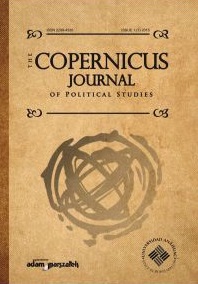The New Third Party in Two-Party System? Circumstances and Implications of UKIP Success in 2014 European Parliament Elections
DOI:
https://doi.org/10.12775/cjps.2014.01.09Słowa kluczowe
United Kingdom Independence Party, UKIP, British Politics, European Elections 2014Abstrakt
For a growing group of voters the UKIP party ceases to be a second choice, and it becomes a main party. But, contrary to popular belief, its electoral success is only partly due to its Eurosceptic program. Its growing support is rather the result of disappointment in policies of the main parties and a sense of alienation of a growing social group, failing to find its way in a liberal, multicultural society. Note, however, that the UK electoral system rewards parties that have geographically concentrated support, yet in case of UKIP it is distributed fairly evenly. For this reason, even a significant popular support will translate only in a small degree into the seats in the House of Commons. UKIP electoral successes has forced the major political parties to modify their policies, which manifested mainly in radicalization of their programs in the area of immigration and asylum policy, as well as their attitude towards the UK’s membership in the European Union.
Bibliografia
BBC (2014). Mapping UKIP’s polling strength. BBC News. Retrieved from http://www.bbc.com/news/uk-politics-29568123.
Crewe, I. & King, A. (1995). SDP: The Birth, Life and Death of the Social Democratic Party. Oxford: Oxford University Press (October 20, 2014).
Ford, R. & Goodwin, M. (2014). Revolt on the right. Explaining support for the radical right in Britain. Oxon: Routledge.
Goodwin, M. & Milazzo, C. (2014). How UKIP’s support has been evolving after the European elections. The Guardian. Retrieved from http://www.theguardian.com/commentisfree/2014/sep/11/ukip-european-elections-british-election-study (October, 2014).
Gruber, O. & Bale, T. (2014). And it’s good night Vienna. How (not) to deal with the populist radical right: The Conservatives, UKIP and some lessons from the heartland. British Politics, 9(3), pp. 237–254. http://dx.doi.org/10.1057/bp.2014.7.
Kellner, P. (2014). How UKIP will win the election. Prospect Magazine. Retrieved from http://www.prospectmagazine.co.uk/opinions/how-UKIP-will-win-the-election (October 20, 2014).
Kellner, P. (2014b). Where UKIP gets its support. You Gov. Retrieved from http://yougov.co.uk/news/2014/02/24/where-UKIP-gets-its-support (October 20, 2014).
Wintour, P. & Watt, N. (2014). UKIP wins European elections with ease to set off political earthquake. The Independent. Retrieved from http://www.theguardian.com/politics/2014/may/26/ukip-european-elections-political-earthquake (October 20, 2014).
Wintour, P. & Watt, N. (2014b). Ed Miliband urged it harden stance on immigration after slim by election win. The Guardian. Retrieved from http://www.theguardian.com/politics/2014/oct/10/ed-miliband-labour-immigration-policy-ukip-byelection (October 20, 2014)
Pobrania
Opublikowane
Jak cytować
Numer
Dział
Statystyki
Liczba wyświetleń i pobrań: 216
Liczba cytowań: 0



